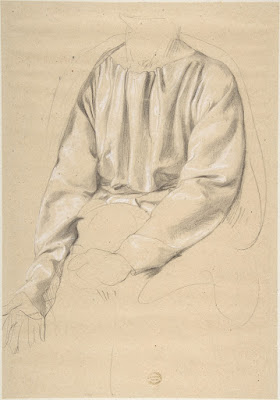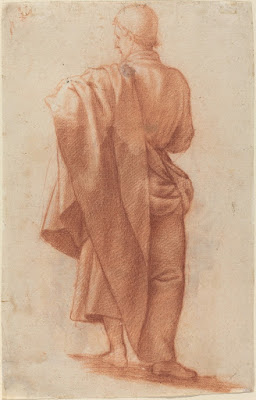 |
| Cherubino Alberti Winged Figure lifting Drapery ca. 1590 drawing Morgan Library, New York |
 |
| attributed to Fabrizio Boschi Study of Draped Youth ca. 1610 drawing Hamburger Kunsthalle |
 |
| Romain Cazes Study of Draped Torso ca. 1860 drawing Metropolitan Museum of Art, New York |
 |
| Jacopo Chimenti Standing Draped Man ca. 1590 drawing Morgan Library, New York |
 |
| Jacopo Chimenti Standing Draped Man ca. 1590 drawing National Gallery of Art, Washington DC |
 |
| Sigismondo Coccapani Standing Draped Man ca. 1620 drawing Princeton University Art Museum |
 |
| Donato Creti Drapery Study for St Paul ca. 1720 drawing Morgan Library, New York |
 |
| Girolamo da Carpi Study of Draped Antique Statues ca. 1549-53 drawing Biblioteca Reale, Turin |
 |
| Anonymous Italian Artist Drapery Study for Virgin Annunciate ca. 1550-1600 drawing Hamburger Kunsthalle |
 |
| Anonymous Italian Artist Putti supporting Drapery ca. 1700 drawing Hamburger Kunsthalle |
 |
| Filippino Lippi Drapery Study ca. 1485 drawing Hamburger Kunsthalle |
 |
| Polidoro da Caravaggio Study of Draped Figure in Motion ca. 1530 drawing Scottish National Gallery, Edinburgh |
 |
| Biagio Pupini Draped Woman with Two Children ca. 1530 drawing Graphische Sammlung Albertina, Vienna |
 |
| Francesco Salviati Study of Draped Figure with Book ca. 1540 drawing Graphische Sammlung Albertina, Vienna |
 |
| Girolamo Siciolante Drapery Study of Kneeling Man ca. 1560 drawing Graphische Sammlung Albertina, Vienna |
 |
| Simon Vouet Drapery Study of Kneeling Deacon with Martyr's Palm ca. 1630-40 drawing Graphische Sammlung Albertina, Vienna |
Dido:
O that I had a charme to keepe the windes
Within the closure of a golden ball,
Or that the Tyrrhen sea were in mine armes,
That he might suffer shipwracke on my breast,
As oft as he attempts to hoyst up saile:
I must prevent him, wishing will not serve:
Goe, bid my Nurse take yong Ascanius,
And beare him in the countrey to her house,
Æneas will not goe without his sonne;
Yet lest he should, for I am full of feare,
Bring me his oares, his tackling, and his sailes: [Exit a Lord.]
What if I sinke his ships? O heele frowne:
Better he frowne, then I should dye for griefe:
I cannot see him frowne, it may not be:
Armies of foes resolv'd to winne this towne,
Or impious traitors vowde to have my life,
Affright me not, onely Æneas frowne
Is that which terrifies poore Didos heart:
Not bloudie speares appearing in the ayre,
Presage the downfall of my Emperie,
Nor blazing Commets threatens Didos death,
It is Æneas frowne that ends my daies . . .
And beare him in the countrey to her house,
Æneas will not goe without his sonne;
Yet lest he should, for I am full of feare,
Bring me his oares, his tackling, and his sailes: [Exit a Lord.]
What if I sinke his ships? O heele frowne:
Better he frowne, then I should dye for griefe:
I cannot see him frowne, it may not be:
Armies of foes resolv'd to winne this towne,
Or impious traitors vowde to have my life,
Affright me not, onely Æneas frowne
Is that which terrifies poore Didos heart:
Not bloudie speares appearing in the ayre,
Presage the downfall of my Emperie,
Nor blazing Commets threatens Didos death,
It is Æneas frowne that ends my daies . . .
– Christopher Marlowe, Dido, Queene of Carthage, act IV, scene iv (1594)